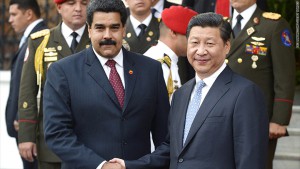The United States no longer has a strong hold in Latin America. American investors are seeing more promising deals at home or elsewhere, resulting in an outflow of cash from the region. China has entered as a competing business partner as a result. Chinese banks increased investments in Latin America by 71% last year, and the country plans to double its trade volume with the Central and South American region over the next decade, a CNN Money article explains. While America is still the number one trade partner with Latin America, China is already beating it in some places, such as in trade with Brazil, Argentina, Peru, and Venezuela.
The relationship is mutually beneficial. Latin America’s abundance of commodities, like oil and soybeans, supply’s China’s needs. At the same time, many Latin countries are in need of cash, which China willfully provides.

However, Though, Chinese and Latin American economies are slowing down, according to the article. Demand for goods is declining in China, and Latin America’s export surplus from commodities is shrinking. Nonetheless, both parties are interested in a long-term relationship. China’s President Xi Jingping vowed to double trade between his country and Latin America over the next decade to $250 billion.
Source: http://money.cnn.com/2015/03/04/news/economy/china-latin-america-relations-united-states/
As the Chinese economies and Latin American economies simultaneously slow, will the two parties look for trade relationships elsewhere? Will a long-term trade relationship between the two remain beneficial, or will more efficient economic outlets be pursued?
We should be careful in reading too much into government pronouncements; Chinese iron producers would inevitably turn to Brazil due to standard market forces. More interesting would be the extent of trade other than commodities.
As to foreign investment, China is the new kid in school. Even if they’re potential standouts in the long haul, on day one they aren’t going to be able to hang out with the “popular” kids. To rephrase, this is a case of diminishing returns: resource development in South America is not new, and non-Chinese firms are the players in the most profitable ones. It’s easy to enter on an upswing; you can get financing for the marginal project. My hunch is that China is now on the wrong side of the profitability margin for a host of projects, and that a year from now we’ll be reading about red ink and potential loan defaults.
From what I have read, China has an interesting foreign policy when it comes to investing in other countries. They aim for the countries that the rest of the world has turned their back to such as Russia and Venezuela. They use foreign investment to create diplomatic relations rather than simply making money off these nations. There investments in Russia and Venezuela have not produced the returns they probably hoped for since these two nations have landed in some serious economic times. That being said, I think it is important for China to maintain healthy relations with Latin American nations.
I can only speak for the case of Argentina, but I wouldn’t say that China “befriended” my country. Yes, Argentina greatly benefits from its economic relationship with China, but the costs of maintaining such relationship are immense and usually, their repercussions are off the radar. In an older post, I commented on the nature of such relationship, which is branded by Argentina’s absolute dependence of China. For example, some of the demanded conditions for the Asian country to import the Argentine soil that keeps agriculture alive, we had to sign outrageous contracts that significantly harm the local railroad industry.